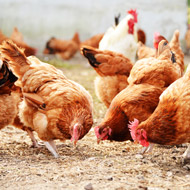GM hens could help save rare birds - study

“These chickens are a first step in saving and protecting rare poultry breeds from loss."
Edinburgh scientists say genetically modified surrogate chickens could hold the key to preserving endangered birds.
A team at the Roslin Institute, alongside US biotechnology company Recombinetics, used genetic editing to develop hens that cannot lay their own eggs, allowing them to be used as surrogates for laying eggs from rare breeds. They are the first gene-edited birds to be produced in Europe.
Led by Dr Mike McGrew, researchers used the genetic tool TALEN to delete a section of chicken DNA. The part of the gene they targeted is called DDX4, which is crucial for bird fertility. It plays a key role in the production of specialised cells, known as primordial germ cells, that give rise to eggs.
Researchers believe primordial germ cells from other bird breeds could be implanted into the chickens, which would then produce eggs containing all of the genetic information from the other bird breeds.
Dr McGrew commented: “These chickens are a first step in saving and protecting rare poultry breeds from loss in order to preserve future biodiversity of our poultry from both economic and climate stresses.”
The findings have been published in the journal Development.



 The Federation of Independent Veterinary Practices (FIVP) has announced a third season of its podcast, Practice Matters.
The Federation of Independent Veterinary Practices (FIVP) has announced a third season of its podcast, Practice Matters.